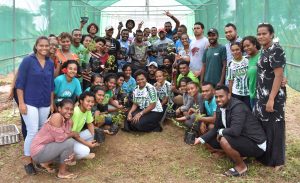

FNU’s Koronivia Campus staff and students commemorating IDOF in 2019.
The theme of this year’s International Day of Forests (IDF), which is on Sunday, 21 March, is “Forest restoration: a path to recovery and well-being.” Fiji is an archipelago of more than 300 islands and represents unique biodiversity and ecosystems. According to “globaltrees.org,” Fiji is home to 1,600 endemic plant species, which means that one can only find these plants in Fiji but nowhere else. Among them, 742 are tree species, of which 183 are known in Fiji’s timber trade.
The IDF this year also reminds me of the critical importance of natural resources. We have not yet overcome the pandemic. Many Fijians who lost their jobs due to the pandemic have gone back to their roots in agriculture and forestry in order to support their loved ones and livelihoods. Healthy forest ecosystems provide us with a wide range of services. Imagine walking into a forest, and there is a supply of clean water and food. When we are cold, trees provide us with shelter and firewood to keep us warm.
At Fiji National University, some of our field trips would take students to Colo-i-Suva, where they would learn the Fijian tree names and the traditional usages of various native trees such as “masi,” which is made from the bark of paper mulberry. Friends visiting from overseas could be taken to Fiji’s famous ecotourism spots to enjoy the aesthetic and recreational beauty of Fiji. In other words, forest ecosystems continue to serve us in all manner of ways. The onus is on us to enhance, maintain, or downgrade these ecosystem services. For instance, Fiji has the world’s crystal-clear and artesian Fiji water is due to the water regulatory service in place. There ought to be the same level of forest regulatory service in place so that we can continue to enjoy our forests.

Chien-Chih Chen.
Often, we take it for granted that the native trees, forests, or ecosystem services will be there, without an effort. However, unless we care, some of the trees that we see today may not be seen by our grandchildren. A check on websites such as the “IUCN Red List of Threatened Species” or “NatureFiji-MareqetiViti,” will reveal that many of Fiji’s endemic tree species are in trouble. Some of the reasons are habitat loss, deforestation, forest degradation, and perhaps climate change (but this is not often the problem). Once a species is gone, its particular ecosystem service is gone as well.
On this day to celebrate the International Day of Forests and to ensure that we can have a sustainable future, I believe that the aim should be to restore, enhance and maintain Fiji’s native forests, as the quest toward a bright future. The Ministry of Forestry started Fiji’s tree-planting initiative in early 2019, aiming to achieve a native tree-planting target of 30 million trees in 15 years. Many non-governmental organisations and international programmes are also contributing their efforts in forest restoration to support the communities.
Considering restoration of the lost ecosystem services, we can use three approaches including forest restoration, agroforestry, and utilisation of degraded agricultural lands. Reported studies have shown that by restoring forest ecosystems, the services provided by the systems can be sustained. Some of the benefits include jobs, enhanced agricultural production, food and water security, recreational experience, flood control, soil and watershed management, and resilience to climate change.
However, forest restoration does not end with planting trees. Trees step their feet on Earth millions of years ago, before us. They have already learned how to work with the environment through adaptation. Scientists may clone a tree, but cannot mimic their interactions with the other species and the environment. Keeping in mind that restoration is a process to help a degraded system recover, we are hoping to re-establish the lost interactions between tree species, the other living organisms (above- and below-ground), and the environment, to continuously provide us with benefits. We will never be able to recreate two equivalent ecosystems.
Therefore, having the right restoration strategy and putting the right species on the right spots will be critical. We should carefully select native species that readapted to the region for planting; otherwise, further problems could arise. If survival trees from the disturbed region can provide sufficient crop of seeds, natural regeneration should be assured.
It is promising that many restoration activities are taking place in Fiji. On a broad consideration, we may need to ask several other questions. Who can do the job? How many trees do we need to plant? Would agroforestry be a better option? After we plant trees, how can we monitor the progress to know a successful restoration? At what point would we know that the ecosystem has been restored? There may not be a silver bullet for all, but to answer these questions requires a team of skilful foresters.
At Fiji National University, we have a strong Forestry team that can train qualified foresters. Some of our graduates working as foresters now and are students continue to engage with industrial attachment in the core areas of forestry. We are strengthening our cooperation and collaboration with the Ministry of Forests and extending the same to existing and emerging businesses, keeping in mind, that diversity creates opportunities.
In Fiji, we will need to bring everyone together to maintain this trajectory of progress and enhance progress into the future. We should all continue to be global citizens. If we do not restore our proud plant diversity and ecosystems, no one else can create opportunities for us.
With this article, I would also like to applaud all the pioneers, current foresters, and everyone who is involved in reforestation all across the world. I thank them for all their hard work.
Let’s each one of us plant a native tree on this International Day of Forests for the benefit of current and future generations.
Chien-Chih Chen
Assistant Professor
Department of Forestry
College of Agriculture, Fisheries and Forestry
Fiji National University